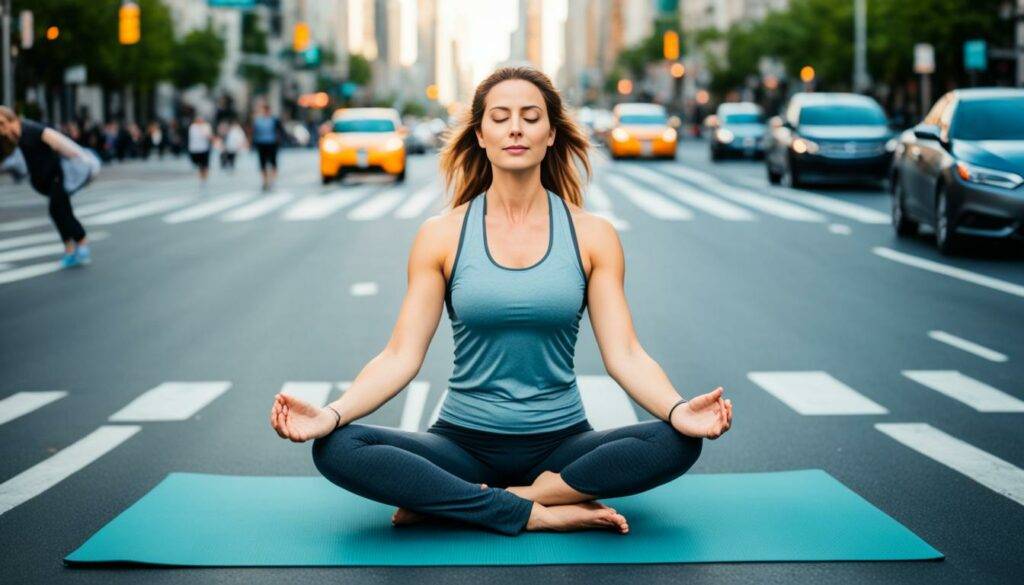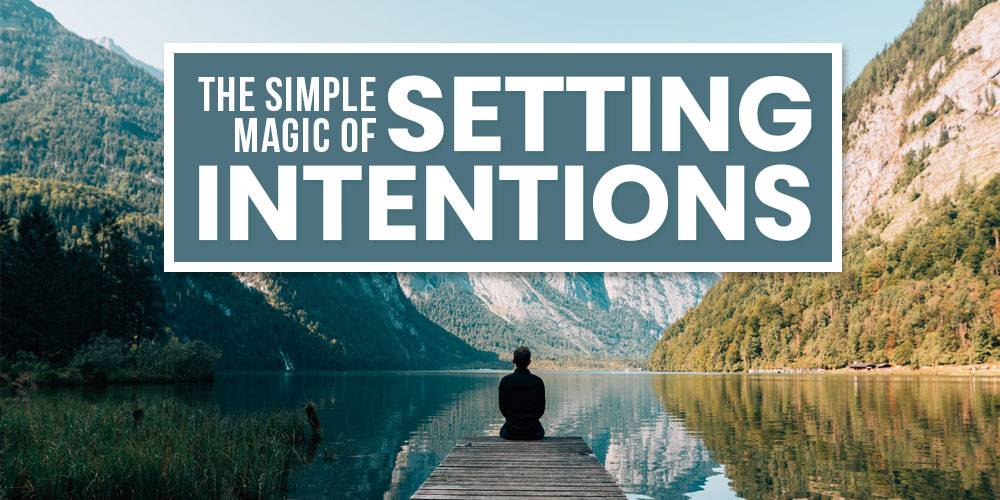“The present moment is the only time over which we have dominion.” – Thich Nhat Hanh
Welcome to a journey of self-discovery and personal growth through mindfulness meditation. Today’s world moves fast, making it easy to lose ourselves. But what if you could find peace and happiness in the midst of chaos?
Mindfulness meditation is a way to change your life from the inside out. It helps you handle life’s challenges with ease and purpose. With simple exercises, you can be fully present and enjoy every moment, connecting deeply with your inner wisdom.
This article will show you how mindfulness can improve your life. We’ll talk about how to add meditation to your daily routine. You’ll also learn about the 5-8-1 method, a powerful technique for beginners and experts alike. Get ready for a journey that can change your life with mindfulness meditation.
Key Takeaways:
- Mindfulness meditation techniques can help reduce stress and improve mental clarity.
- These practices enhance self-awareness and regulate emotions.
- Mindfulness meditation has positive effects on physical health, such as lowering blood pressure and improving sleep quality.
- By incorporating meditation into your daily routine, you can cultivate peace and happiness.
- The 5-8-1 method is a transformative mindfulness technique that you can explore.
The Benefits of Mindfulness
Mindfulness is more than just a trendy meditation practice. It brings many benefits that can improve your well-being. Adding mindfulness to your daily life can help reduce stress, improve mental clarity, and manage emotions better. It also boosts self-awareness and can lower anxiety and depression.
One major benefit of mindfulness is it helps reduce stress. By focusing on the now and letting go of worries, you can feel calm and relaxed. This can lessen the negative effects of chronic stress on your mental and physical health.
Practicing mindfulness also improves your thinking skills, making you more focused and clear-headed. It trains your mind to stay in the moment. This leads to better productivity and efficiency in your daily tasks.
Mindfulness is key for managing emotions. It helps you understand and control your feelings without judgment. This leads to healthier relationships with others and yourself.
It also boosts self-awareness. By paying attention to your thoughts, feelings, and body, you learn more about yourself. This knowledge lets you make choices that match your values and goals, making life more meaningful.
Studies show mindfulness is effective in fighting anxiety and depression. Regular meditation can lessen the symptoms of these conditions. It helps you feel emotionally better and more resilient.
But mindfulness isn’t just good for your mind and heart. It also has physical health benefits. Studies link it to lower blood pressure, a stronger immune system, and better sleep.
Adding mindfulness to your life can have many positive effects. Start experiencing its power by making it part of your daily routine. Begin your journey to a calmer, clearer, and more balanced life today.
Incorporating Meditation into Your Daily Routine
To feel the true power of meditation, make it a daily habit. Adding meditation to your day brings peace, clarity, and well-being. Here are tips to make meditation fit into your busy life:
Choose a Convenient Time
Find a time that suits you for meditation. It could be early morning, during lunch, or before bed. Pick a time you can commit to every day. This makes meditation a habit and brings benefits.
Create a Peaceful Space
Designate a quiet spot in your home for meditation. It doesn’t have to be fancy—just a place where you can sit or lie down easily. Adding candles, cushions, or a calming picture can make it more inviting.
Start Small
Don’t worry about meditating for hours right away. Begin with short sessions, like five or ten minutes. Then, slowly increase the time as you get more comfortable. It’s better to meditate regularly for a short time than not at all.
Focus on Your Breath
Focusing on your breath is a simple way to meditate. Sit comfortably and pay attention to your breath going in and out. If your mind drifts off, gently bring it back to your breath. This helps you concentrate and stay in the moment.

Explore Guided Meditations
Guided meditations are great for beginners. There are many apps, websites, and podcasts offering these sessions. They provide clear instructions and soothing guidance to help you start meditating.
Practice Mindfulness in Daily Activities
Meditation isn’t just for sitting still. You can be mindful while eating, walking, or doing dishes. Focus on the now and use all your senses to make everyday tasks peaceful and aware.
Be Patient
Meditation is a skill that grows over time. Be kind to yourself and don’t judge your progress. Enjoy the journey and see each meditation as a chance to learn and grow.
Make a special space and time for meditation in your day. With regular practice, you’ll see how it changes your life. It brings mindfulness and deepens your connection with yourself and the world.
The 5-8-1 Mindfulness Technique
Adding mindfulness to your daily life can boost your well-being. The 5-8-1 mindfulness technique is a great way to do this. It mixes 5 minutes of movement, 8 minutes of meditation, and 1 minute of deep breathing.
Physical Movement
Start with 5 minutes of physical movement. This helps you stay fit and clears your mind. You can walk fast, climb stairs, stretch, or do yoga.
Mindfulness Meditation
Next, spend 8 minutes meditating. This means focusing on now and noticing your thoughts without judging them. You can use apps like Calm, Peloton, or UCLA Mindfulness to help.
Deep Breathing
End with 1 minute of deep breathing. This lowers stress and helps you relax. Try box breathing: breathe in for 4 counts, hold for 4, breathe out for 4, and hold again for 4. Do this for 1 minute.
Using the 5-8-1 mindfulness technique daily brings together movement, meditation, and deep breathing. This mix can reduce stress, improve focus, and increase your overall well-being.

Recommended Mindfulness Activities
There are many ways to add mindfulness to your daily life. These activities help you become more aware and present. They also reduce stress and improve your well-being. Here are some mindfulness activities you can try:
1. Deep Breathing Exercises
Deep breathing is a simple way to relax and calm your mind. Find a quiet spot, sit comfortably, and focus on your breath. Breathe in deeply through your nose and out through your mouth. This can bring you into the present moment and make you feel peaceful.
2. Body Scan Meditation
In body scan meditation, you pay attention to different parts of your body. Notice any sensations you feel. This practice helps you become more aware of your body and can help you relax.
3. Mindful Walking
Take a break and go for a mindful walk. Notice each step, the feeling in your feet, and the sounds around you. Walking mindfully connects you with nature and brings peace.
4. Guided Meditation
Guided meditation is great for beginners. Use apps or recordings to help you focus and relax. It’s a way to explore mindfulness.
5. Journaling
Writing in a journal can be a mindfulness practice. Reflect on your thoughts, feelings, and experiences. It helps you gain clarity and become more self-aware.
6. Mindful Eating
Be mindful when you eat next time. Notice the flavors, textures, and smells of your food. Eat slowly and enjoy each bite. Mindful eating makes you grateful and helps you have a healthy relationship with food.
7. Gratitude Practice
Take time each day to think about what you’re grateful for. It could be something simple like a beautiful sunset or a loving relationship. Being grateful improves your well-being and focuses you on the positive.
8. Loving-Kindness Meditation
Loving-kindness meditation is about feeling love and kindness towards yourself and others. Repeat phrases like “May I be happy, may I be healthy, may I be safe” for yourself and others. This practice builds empathy and connection.
9. Visualization
Use your imagination to picture a peaceful place. Close your eyes and see yourself in nature, feeling calm and serene. Visualization is a powerful way to reduce stress and relax.
10. Mindful Listening
Pay attention to the sounds around you, like birds chirping or soft music. Mindful listening helps you stay present and appreciate the sounds in your life.
11. Nature Mindfulness
Being in nature is a great way to practice mindfulness. Go for a hike, sit by the ocean, or walk in a park. Let nature’s beauty fill you.
12. Digital Detox
Take breaks from technology with a digital detox. Use this time for mindfulness activities like reading or spending time with loved ones. Disconnecting from screens helps you reconnect with yourself and the present.
| Activity | Benefits |
|---|---|
| Deep Breathing Exercises | Reduces stress, promotes relaxation |
| Body Scan Meditation | Increases body awareness, promotes relaxation |
| Mindful Walking | Connects with nature, brings a sense of grounding and peace |
| Guided Meditation | Helps focus attention, relaxes the mind |
| Journaling | Cultivates self-awareness, provides clarity |
| Mindful Eating | Develops healthy relationship with food, enhances gratitude |
| Gratitude Practice | Enhances overall well-being, shifts focus to positivity |
| Loving-Kindness Meditation | Fosters empathy, cultivates positive feelings towards others |
| Visualization | Reduces stress, promotes relaxation |
| Mindful Listening | Cultivates presence, enhances appreciation for auditory experiences |
| Nature Mindfulness | Connects with nature, promotes sense of awe and wonder |
| Digital Detox | Allows for relaxation, encourages present moment awareness |
Conclusion
Adding mindfulness and meditation to your daily life can change how you feel. Just a few moments each day can lead to big changes in your mental, emotional, and physical health.
Mindfulness helps you stay in the moment, lowering stress and boosting self-awareness. Meditation brings calm and clarity, making you feel more peaceful and balanced.
By focusing on mindfulness and meditation, you’re looking after yourself. You’re building a base for a life that’s more mindful and rewarding. So, take a deep breath and make these habits part of your daily routine. Your mind, body, and soul will be grateful.
FAQ
What are some mindfulness meditation techniques?
Mindfulness meditation includes techniques like mindful breathing and body scan meditation. You can also try walking meditation, loving-kindness meditation, and transcendental meditation. Other methods are vipassana meditation, zazen meditation, and chakra meditation.
What are the benefits of mindfulness?
Mindfulness helps reduce stress and improves mental clarity. It also helps with emotional regulation and self-awareness. Plus, it can lessen anxiety and depression symptoms.
It also boosts physical health by lowering blood pressure and improving sleep.
How can I incorporate meditation into my daily routine?
Start by picking a good time and making a peaceful spot for meditation. Begin with short sessions and slowly add more time. Use your breath as a simple focus.
Try guided meditation and be mindful in everyday tasks. Remember, meditation is a skill that grows over time.
What is the 5-8-1 mindfulness technique?
This technique mixes 5 minutes of movement, 8 minutes of meditation, and 1 minute of deep breathing. You can move by walking, climbing stairs, stretching, or doing yoga.
Use apps like Calm or Peloton for meditation. For deep breathing, try box breathing for a minute.
What are some recommended mindfulness activities?
Great activities include deep breathing and body scan meditation. Mindful walking and guided meditation with apps or recordings are also good. Journaling, mindful eating, and gratitude practice help too.
Other activities are loving-kindness meditation, visualization, mindful listening, nature mindfulness, and digital detox. These help you stay in the moment and reduce stress.
How can mindfulness and meditation bring transformative changes to my life?
By spending a little time each day on mindfulness and meditation, you’re caring for your mind, heart, and body. These practices reduce stress and help you understand yourself better.
They also improve how you handle emotions. This leads to a more mindful and balanced life, changing you in big ways.




























































